When some people retire, they have a party. Others may splurge on something bigger– a dream vacation, say. When Larry and Jeanine Kuhlken retired in the early 1990s, they decided to start a vineyard. Although the couple had little experience farming, they were welcomed and mentored by other growers in the Hill Country and a good thing took root.
Today with son David at the helm, the Kuhlken’s retirement plot has grown an award-winning, Hill Country winery: Pedernales Cellars. Today Pedernales Cellars boasts a large tasting room, event space, and winemaking facility in Stonewall, just off highway 290 on the Hill Country Wine Trail. Pedernales Cellars produces about 10,000 cases of wine each year, using grapes grown on the Kuhlken family estate, along with those from other family farms in the Texas Hill Country and High Plains regions.
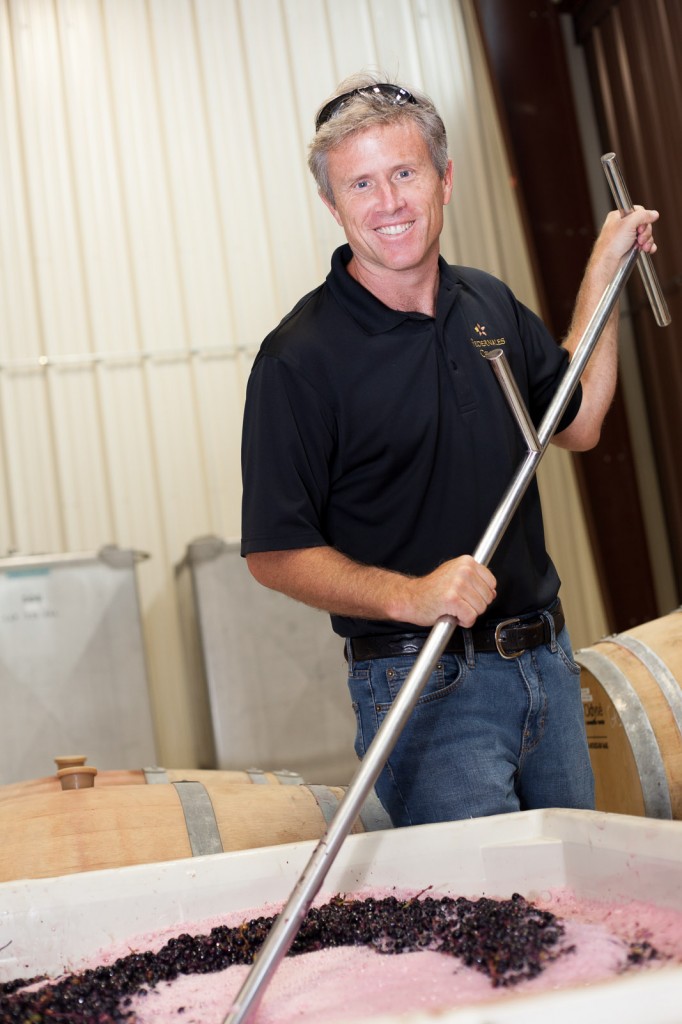
Pedernales Cellars winemaker David Kuhlken punches down a container of pressed syrah grapes at his Stonewall winery. These grapes are syrah harvested from the Newsom vineyards in the High Plains area of Texas. Photo by Cathlin McCullough.
I recently toured Pedernales Cellars’ newly expanded winemaking facility in Stonewall, to see the winemaking process firsthand and to meet winemaker David Kuhlken, pictured above. The tour coincided with the end of “crush,” the frenetic grape harvest season which in Texas stretches from mid-August to October. David was in Stonewall for a few days that week to oversee the first fermentation of a crop of Tempranillo grapes, which eventually will become Pedernales Cellars’ Tempranillo 2014 release.
For a small vineyard like Pedernales Cellars, crush is an exhausting season. David works closely with his farmers to pick the grapes when yield and flavor are at their peak. This involves visits to the vineyards, and a good eye for conditions. Since 2009, David has put more than 185,000 miles on his trusty Honda Fit making the loop from Austin to Fredericksburg to Lubbock during the busy harvest season.
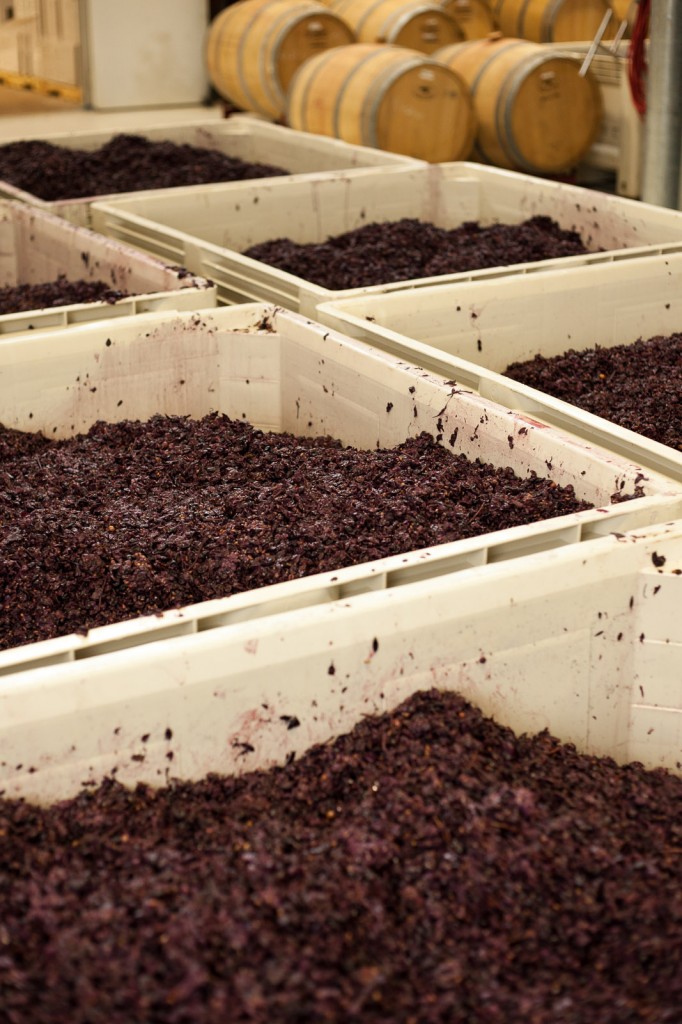
These grapes have been harvested, pressed, and are sitting in open-air fermentation vessels at Pedernales Cellars. Photo by Cathlin McCullough.
The relationship between winemaker and farmer is deep. David begins working with growers at least three to four years before harvest, so they have a stable demand for grapes and can plant the specific varieties that David requests. They stay in constant communication throughout the year and especially at harvest time. David is quick to credit the expertise and dedication of Texas farmers such as the Bingham, Newsom, Reddys, and Timmons families when he talks about making wine. And don’t forget about Larry and Jeanine! The Kuhlken family still grows many varieties at their Fredericksburg estate.
Once the grapes are harvested, they are transported by truck to the Pedernales Cellars Stonewall winery, where a small team of experts works nearly round the clock to press and ferment the grapes. David says that coordinating the harvest, transportation, and beginning stages of winemaking has a huge impact on the quality of the finished product. “The early part is mostly making sure that nothing goes wrong,” he said.
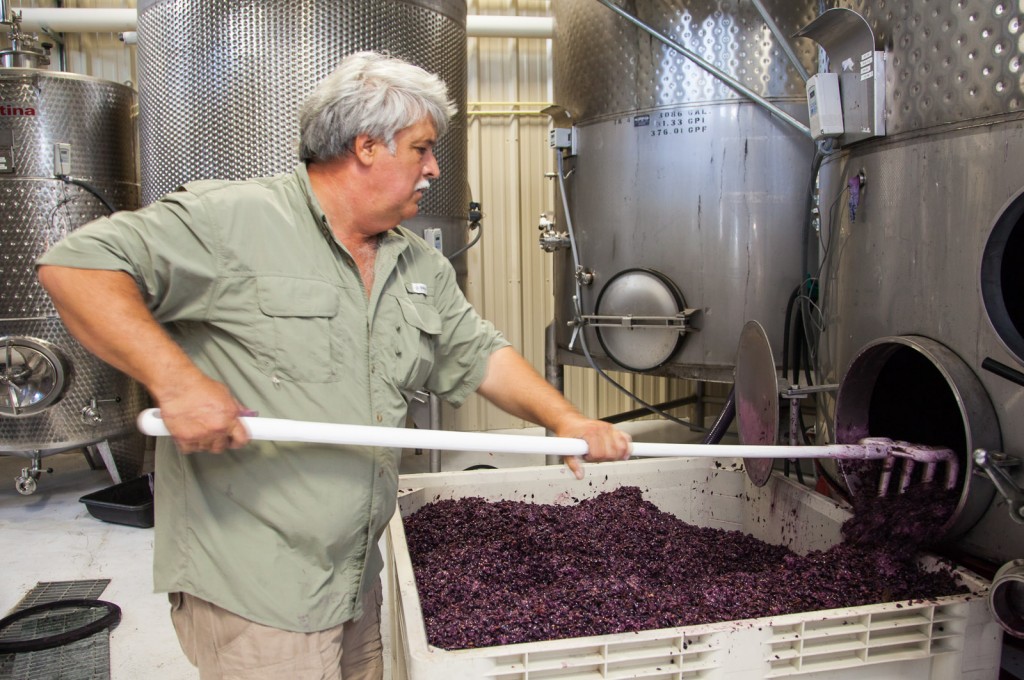
General Manager Jim Brown removes tempranilllo grapes from Pedernales Cellars’ 3,000 gallon fermentation tank. Brown joined Pedernales Cellars in 2008, after serving as General Manager of Becker Vineyards for 13 years. Jim’s son is the vineyard manager for Pedernales Cellars, and the two work nearly round-the-clock during crush each year.
Making wine with Texas grapes requires a lot of skill on the part of the winemaker. The terroir of each growing region in Texas is unique, so tracking which field each harvest is from is essential to the quality of the wine. According to David, tempranillo grapes grown in the Hill Country have an earthy flavor, with truffle and mushroom overtones. High Plains grapes are more fruity and aromatic. The blend of grapes in David’s award-winning Tempranillo Reserve varies from year to year, depending on the weather patterns and specific growing conditions in each part of the state.
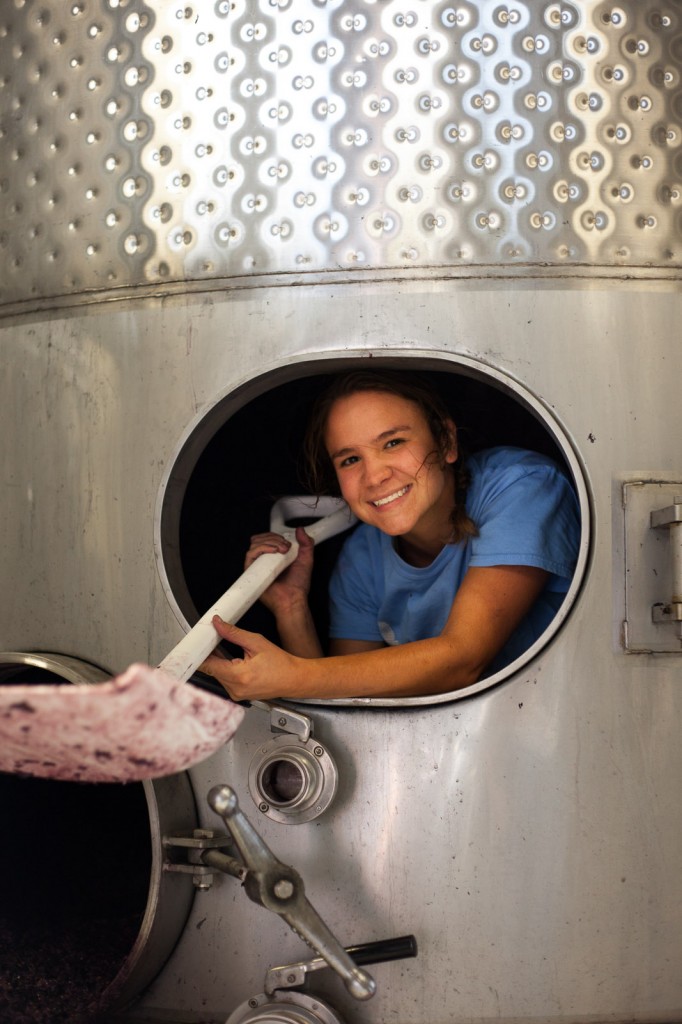
Sustainability Manager Grace Lahasky, a recent graduate of The University of Texas at Austin, helps get the last of the grapes out of a fermentation tank at Pedernales Cellars. Photo by Cathlin McCullough.
The type of wine that Pedernales Cellars produces is heavily dependent on the weather as well. For example, the winery specializes in Rhone style wines such as tempranillo, GSM, and sultry red blends. These varieties of grapes tend to thrive in the Texas heat and can withstand cool evening temperatures in the fall and winter. Varieties such as the lenoir grape are also resistant to Texas-sized pests.
It’s not all smooth sailing, though. One hard freeze can knock out an entire varietal of grapes, as happened with the 2013 viognier from the Lubbock area vineyards. “Last year was awful,” David said, recounting the frequent deep freezes. “Some varietals were okay but by and large we didn’t have a harvest from the High Plains in 2013.”
Weather volatility is a constant in Texas, and Pedernales Cellars has found creative ways to roll with the punches. One silver lining of the 2013 freeze is Pedernales Cellars’ Cinco 2013. This white blend uses five varieties of Texas-grown grapes that miraculously produced through the freeze: chenin blanc, blanc dubois, viognier, alborino and rousanne. None of these grapes yielded enough for their own varietal, so David blended them together in a once-in-a-lifetime run called “Cinco,” which has elements of rosé and caramel in the finish.
“When you’re buying Texas wine, you are supporting something that has been made on a very small scale. We as winemakers are not going to be able to count on the consistency of varietals, so we’re always trying something different,” David explained.
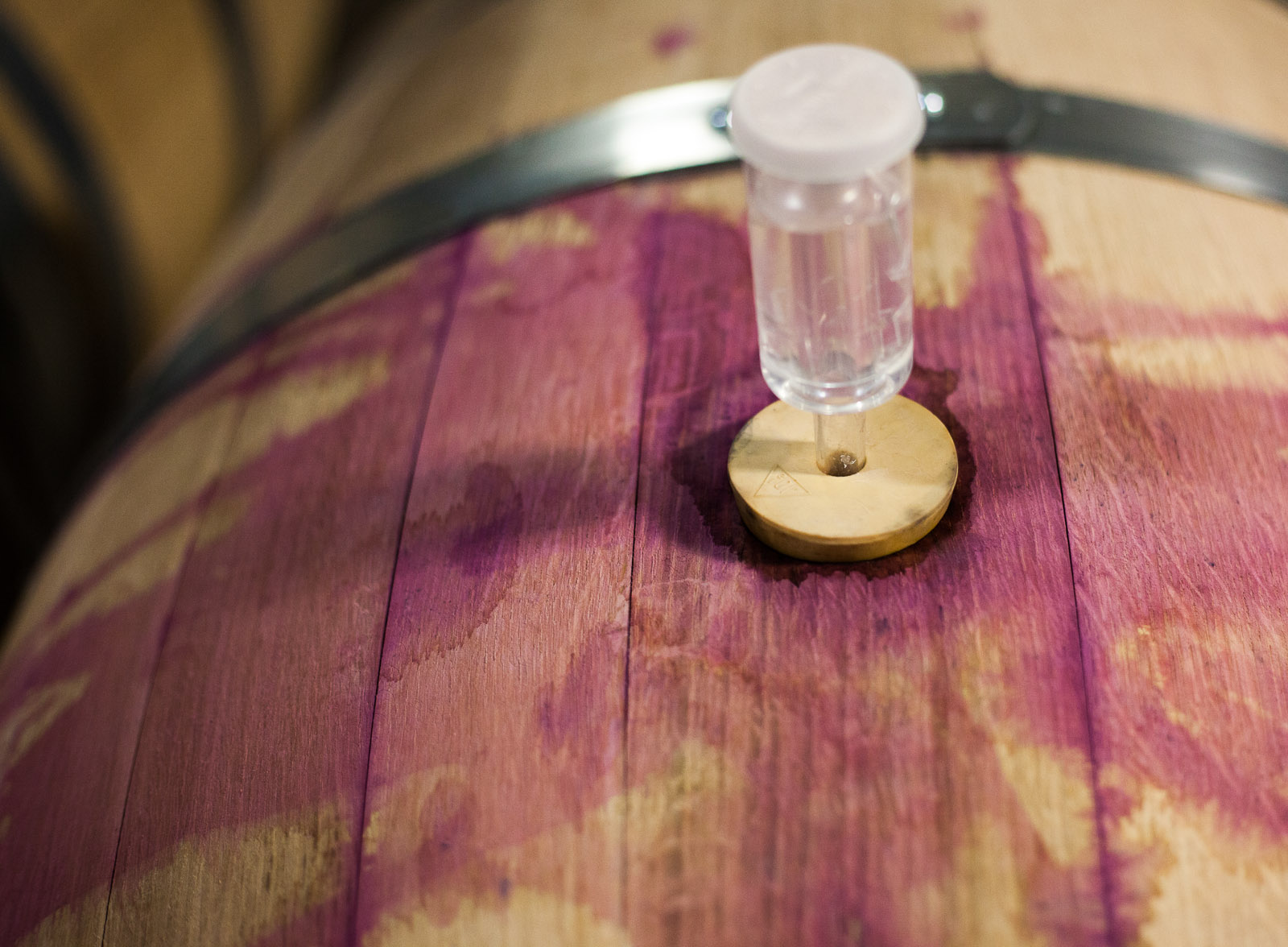
Photo by Cathlin McCullough.
This matter-of-fact attitude and commitment to supporting Texas growers is evident across the entire Pedernales Cellars operation. The tasting room boasts three certified sommeliers, the most of any Central Texas winery, and the staff is quick to point out that Pedernales Cellars supports their continuing education. The tasting room gift shop also features locally produced goods such as lavender, cheese, and cookbooks by local chefs. David sees the winery’s tasting room as key to the business success of the operation, and prioritizes his best releases for direct distribution to wine club members.
Growing demand for local wine by area chefs and retail buyers is another priority for the winery. The Pedernales Cellars winemaking facility was built in 2008 and expanded this year to include additional space and equipment. The extra space in the facility will allow Pedernales Cellars to increase its output from 10,000 to 15,000 cases of wine each year, and increase distribution to area restaurants and stores.
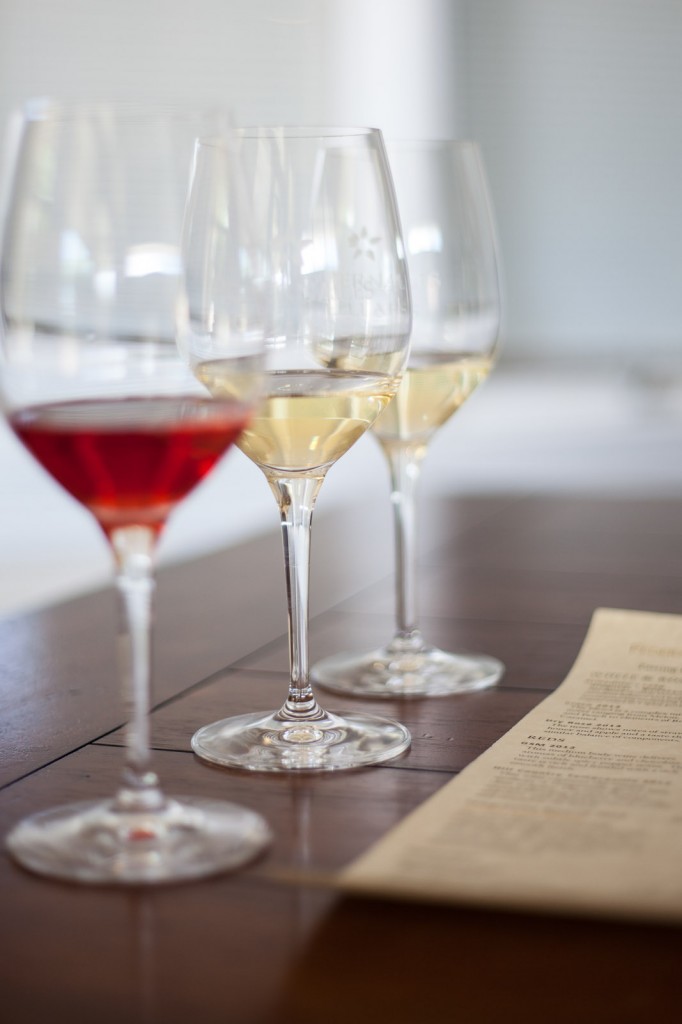
A flight of white and rosé wines in the tasting room at Pedernales Cellars. Photo by Cathlin McCullough.
The additional space at Pedernales Cellars is a good thing for other Hill Country wineries, too. Four different beginning winemakers have “co-oped” in the Pedernales space since it was built. These artisans are working and cost-sharing with the Kuhlken family much in the same way that Larry and Jeanine did when they planted the family’s first plot of grapes back in the 1990s. David credits neighboring Texas Hills vineyard with helping Pedernales Cellars get started, and said that teamwork amongst Central Texas wineries is essential to the success of the region.
“Whenever we have someone in here, it’s and exchange. We learn something from them and they learn from us. Everyone’s trying to cooperate, not just on growing grapes, but also in advocacy and marketing. At the end of the day, we’re all in the same boat. There’s this clear and obvious need to cooperate; people want to see a whole industry establish itself.”
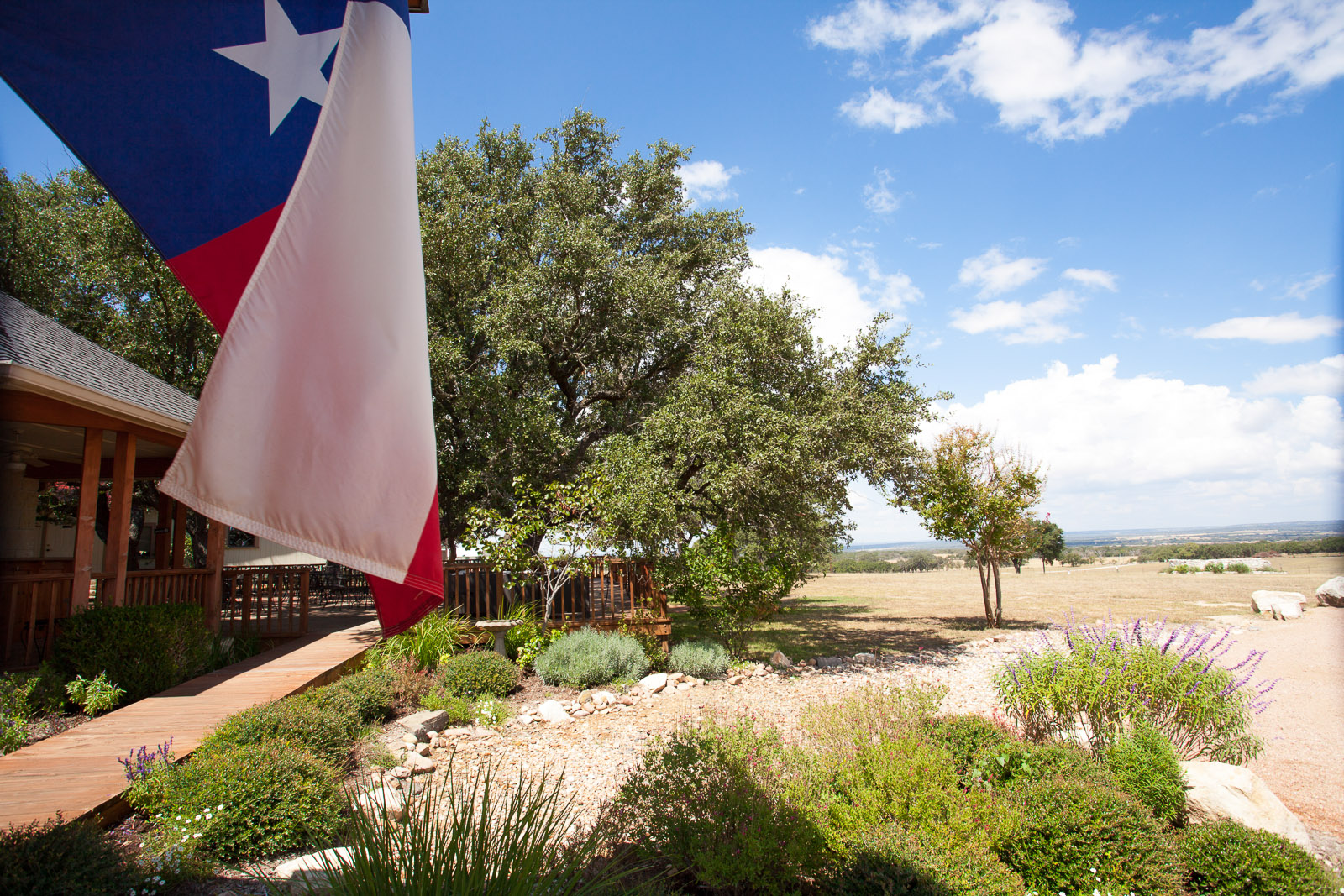
The stunning view of the Texas hill country from Pedernales Cellars’ tasting room in Stonewall, Texas. Photo by Cathlin McCullough.
